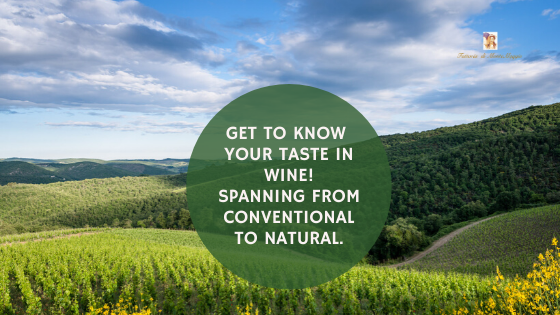
We are in a difficult period where the Coronavirus is still raging all over the world. As a result of the shelter in place or lockdown in many countries, the economy is in difficulties and heading towards a possible recession. Still, future recession or not, quality will always be important. However, as we have seen, the environment is blooming now that people are traveling less and polluting nature less. Our environment is indeed important for our future success.
Environment and quality. Two concepts that go hand in hand.
Environment and Quality in Winemaking
When it comes to viticulture and wine in Italy, you might think it is all fairly easy, right?
Either you are more of a conventional winery or you are organic.
But, wait, what about biodynamic then?
Alright, so you can be conventional, organic, or biodynamic.
Well, yes, but it does not really end there.
A fourth alternative is natural wine.
However, what about ‘vino libero’ (free wine)?
You see there are so many different layers of the different categories, and probably even more than the ones we will talk about here, namely conventional and ‘vino libero’ as a sub-category, organic, biodynamic, and natural wine.
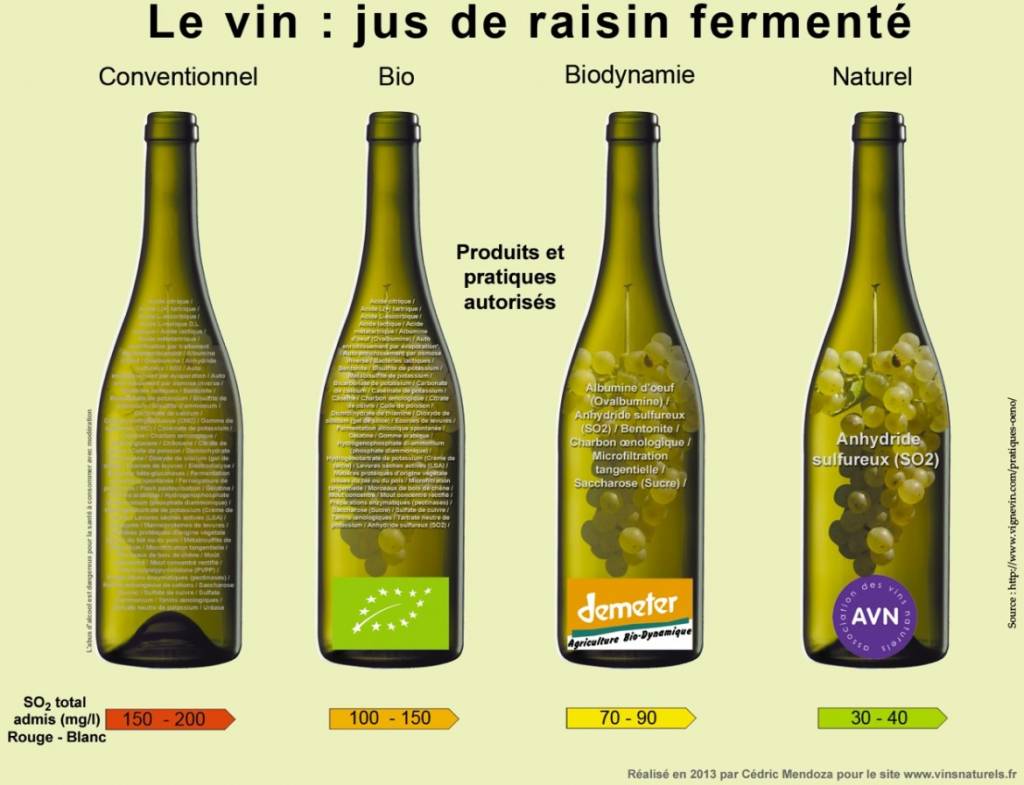
Source: www.thecookstays.com
Let us start from the organic and biodynamic wines and then continue to the other wine production categories.
Organic wine
Organic wine can in an easy way be explained as wines being made with organically cultivated grapes at a winery.
The founding father of organic farming theories is considered to have been the English botanist Albert Howard who for many years carried out research on the behalf of the British Empire in India. Another key player and the person who is said to have coined the term ’organic farming’ was Walter James, 4th Baron Northbourne, back in 1939. (See more in our article Organic Farming at Montemaggio.)
The idea of organic farming was developed as a way to find solutions to ever-present problems in farming, such as soil depletion, erosion, the decline in crop variety effectiveness, etc.
Today, more and more wineries are understanding the value of becoming organic and, in that way, stepping away from the use of chemical products and additives in the vineyard and in the winemaking process. There is a set of additives allowed in the wine cellar such as animal enzymes, isinglass, gelatine, resins, yeast, etc. To be certified as a vegan wine you thus would need to eliminate all the animal-related additives.
In organic farming, copper and sulfur are used to protect the vines against fungal diseases such as different kinds of mildew. Organic farming in Europe and the regulated use of copper and sulfur is clearly defined in the general EU standards, namely Regulation (EU) 834/2007 and Regulation (EU) No 203/2012 (the latter regarding added sulfites limits).
There is a major difference between organic wine in Europe and Canada versus the USA. In Europe and Canada, organic wine can contain added sulfites while this is not allowed in organic wines in the US.
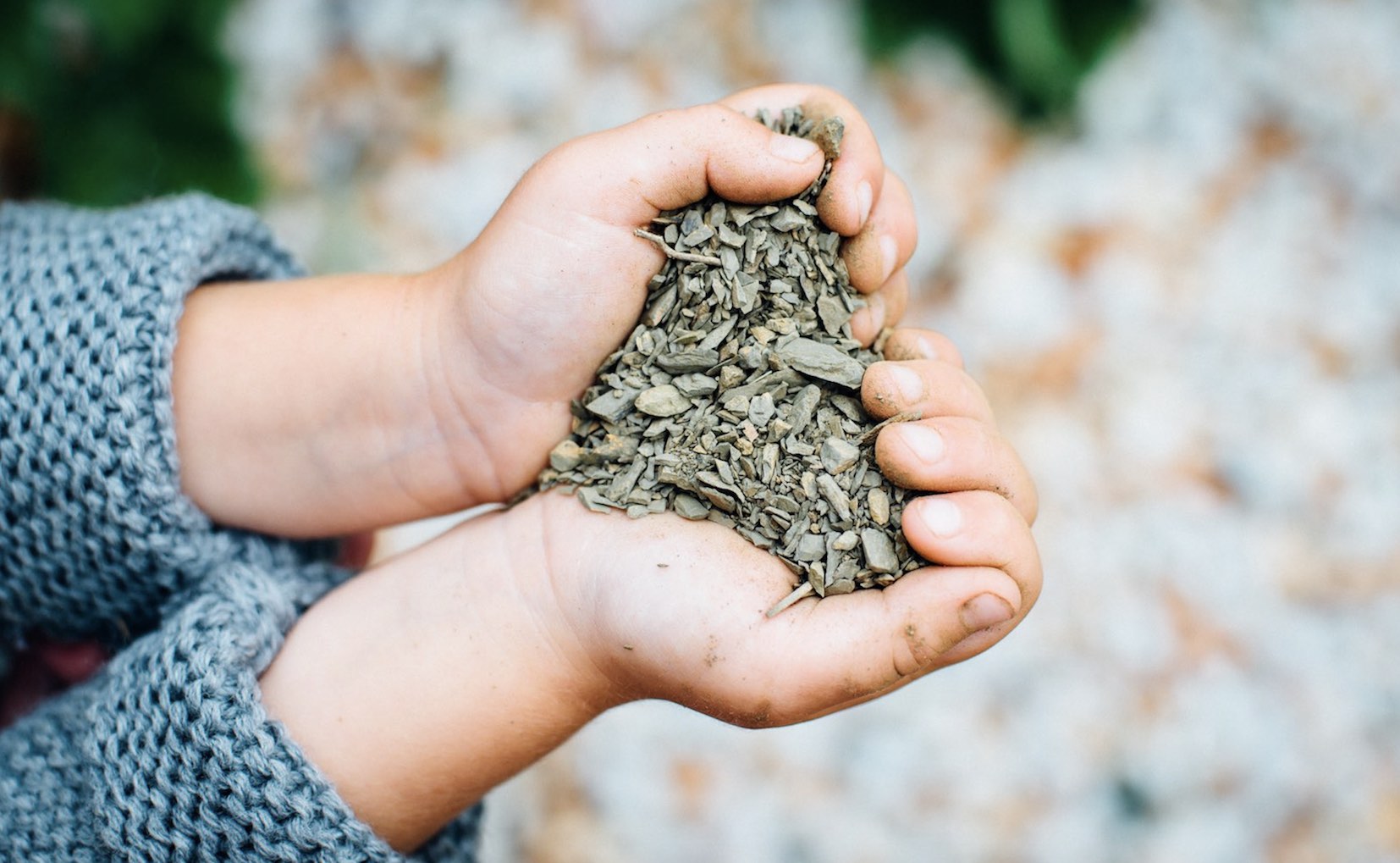
Biodynamic wine
Biodynamic wine can be considered a continuation of the organic farming concept though, taking it one step further. Apart from adding an astrological, mystical, and spiritual side that was presented by the Austrian philosopher Rudolf Steiner in the 1920s, biodynamic farming has a holistic view of nature. This means that it considers a farm as a closed, or self-sustaining, organism or ecosystem.
In biodynamic farming, different herbal and mineral extracts, as well as cow manure are used to be sprayed on the land and the vines as well as in compost. It is also believed that the constellation of the moon and the planets have a certain influence on the vegetative growth cycle. This is in line with ancient agricultural practices and beliefs.
Research has shown that biodynamic techniques can improve soil quality overall.
Many wineries are not full out biodynamic but choose to adopt only certain biodynamic methods, often as regards vineyard management. It is becoming more and more farming theory and method that is being used in order to safeguard the land and the quality and health of your products. The Demeter Association is the organ that handles the certification for biodynamic farming.
Some biodynamic wineries are even using draught horses to plow or turn the soil in the vineyard. The work that goes into training the draught horses and learning the mechanisms can take time but the benefits are then worth it in the long run. The use of draught horses is more cost-effective and it reduces the soil and environmental impact.
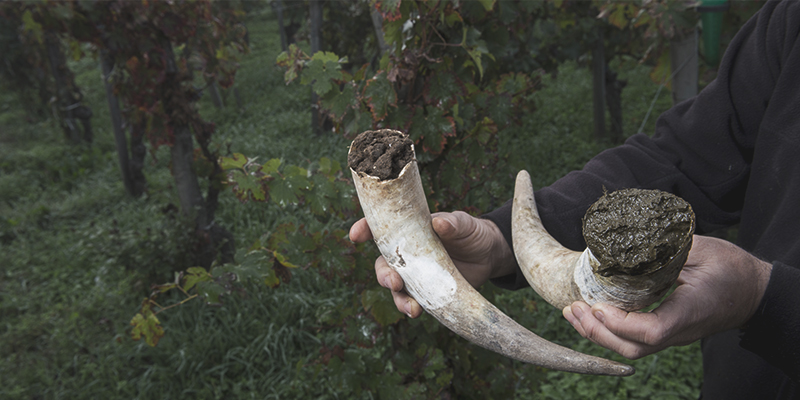
Source: www.vinepair.com
Natural wine
When writing this article, it has just been announced that the French authorities have acknowledged and approved the production of natural wines. The wines produced within this new denomination will be labeled as ‘vin méthode nature’. (See France Officially Recognises Natural Wine in The Drinks Business.)
For the rest of the world, there are still no recognized denominations for natural wines. In Italy, there are two main associations Vin Natur and Vini Veri. Vin Natur in its present shape was founded in 2006 with Angiolino Maule at the helm and it embraces 170 producers from 9 different European countries. Vini Veri defines themselves as a consortium and has mainly Italian producers as members.
What is natural wine then?
Some of you might think that it would be wine produced by an organic or biodynamic winery taking it one step further. However, in reality, there is, in Italy at least, no regulation regarding whether you should be conventional, organic or biodynamic. It is, of course, better if you are certified organic or biodynamic.
What is important though is that you:
- are independent as a winery
- do not use any pesticides or chemical products in the vineyard
- handpick the grapes during the harvest
- do not use any additives or selected yeasts in the cellar
- only wild fermentation with natural yeats
- add no sulfites or as little as possible
Therefore, you could, actually, be conventional, focused on sustainability as long as you do not make use of any chemical or synthetic products. And there are wineries being without any organic or biodynamic certification producing natural wines.
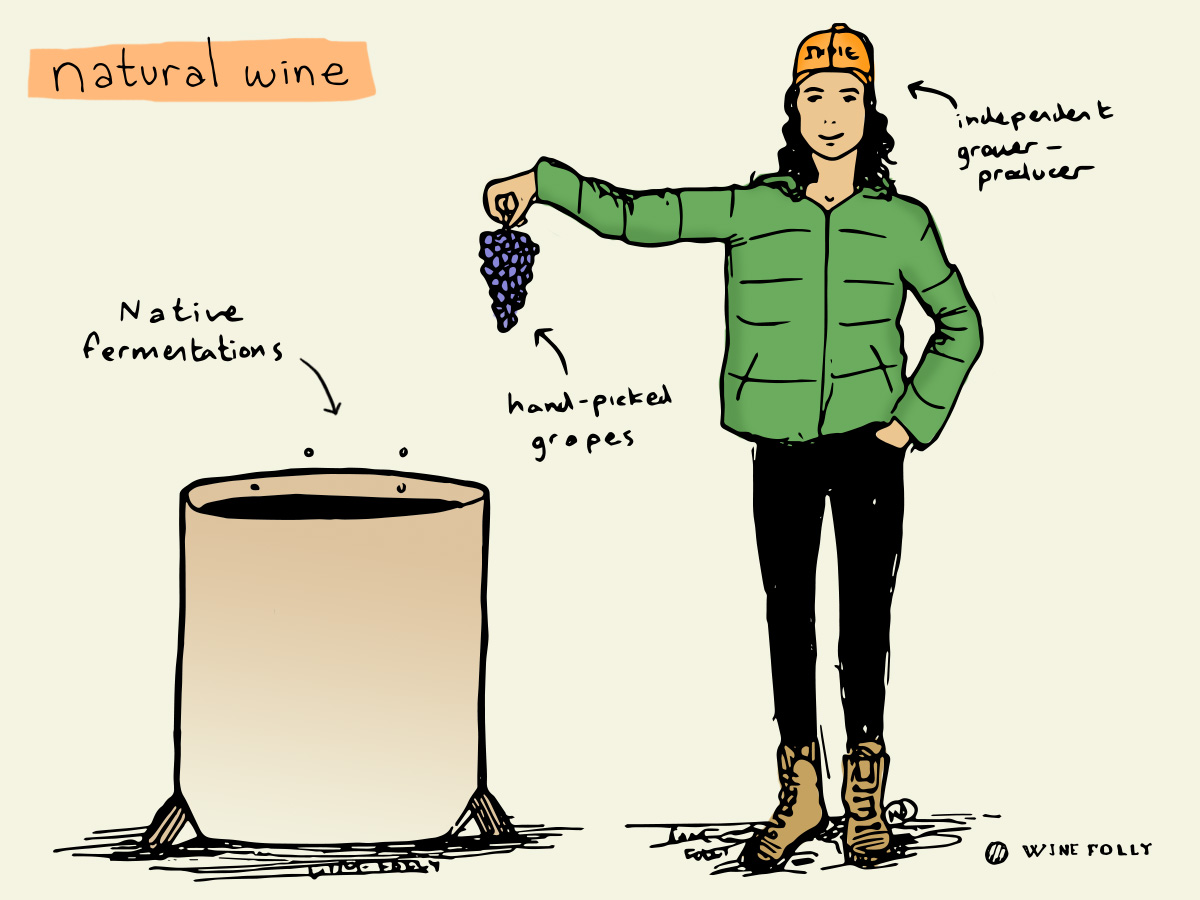
Source: www.winefolly.com
Conventional wine
What is conventional wine and is it really only bad? Well, most wines are still made in a conventional way and there are many good and well-made wines produced by conventional wineries.
Conventional wineries can use chemical products such as herbicides and pesticides in the vineyard and additives in the wine cellar. The use of synthetic fertilizers and pesticides in farming started back in the era of World War II. It was, and is, an efficient way to keep diseases and invasive insects away, in this case, from the vineyard. Of course, the use of chemical products is in the long run not healthy neither for the soil nor for the people working in such an environment.
There is another part of conventional management called integrated pest management. This is a model where the use of chemical and toxic interventions is kept at a very reduced level, i.e. a level that is economically justified and presents minimal risk to the environment and people’s health.
A sort of combination of conventional, integrated pest management, and organic farming is the “Vino Libero” method. The Association “Vino Libero” was founded by a group of wineries from north to south in Italy, and one distillery.
Basically, the association defines itself as having a dynamic model where they combine care for the soil in favor of protecting the environment at the same time as being beneficial economically. In the vineyard, they are trying as far as possible to not use any chemical products as well as cutting down the use of sulfur dioxide in the winery by 40%.
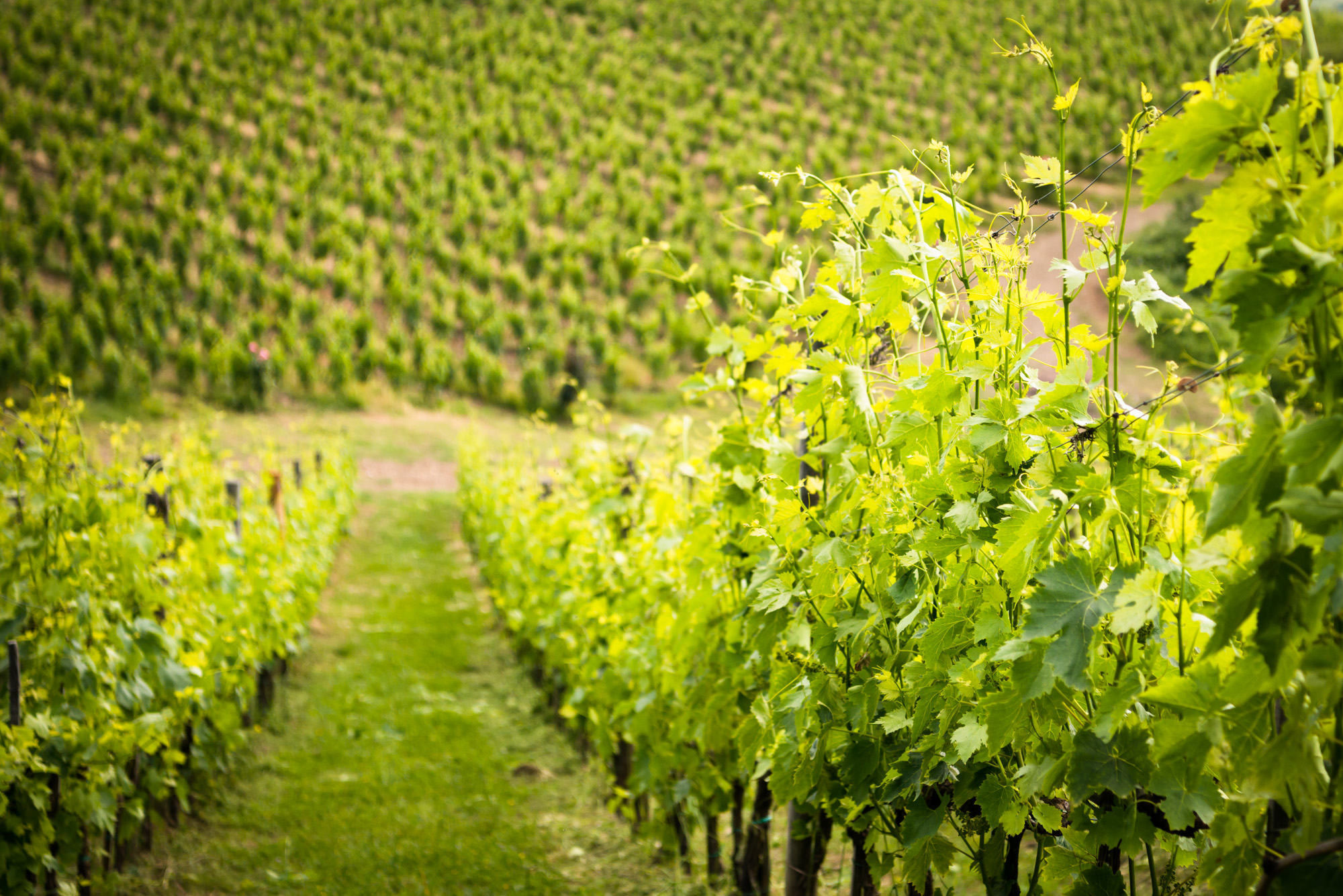
Towards More Healthy Wines
The tendency today is to valorize the environment and favor sustainable farming methods. More and more wineries are taking the step to become certified organic as a way to step away from using synthetic herbicides or pesticides in the vineyards. The focus on the environment and people’s health is paramount today.
However, conventional wine and different versions of conventional farming and winemaking is still an important part of winemaking in Italy and in the world. Many within the conventional category are moving towards reduced use of chemical products. Some are even becoming sustainable and eliminating the use of pesticides but not wanting to go through bureaucracy to become certified organic.
Biodynamic farming takes it one step further by relying on mainly herbal and mineral extracts that are sprayed on the land and in composts.
Natural wine is, more than a farming method, a wine-producing philosophy that is based on the idea to have as little intervention as possible during the winemaking process. No use of chemical products, no selected yeast, no filtration or clarification, as little sulfites added as possible.
There are indeed many different types of wines. In the end, it is all a question about taste and how important the environment and sustainability are for the consumers.
Written by Katarina Andersson.






Leave a Reply